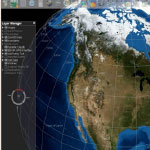GeoInformatics
Master of Science in Integrated Scientific Applications
GeoInformatics (GI)

The GI specialization focuses on remote sensing, data structures and data mining, GIS, and image processing, analysis, and interpretation. It is designed to prepare professionals who want to specialize in integrating earth imaging with georeferencing.
Career Opportunities
Listed below are just a few of the job areas that are relevant to the GI specialization:
- Data analysts
- Project managers
- Research technicians
- Database administrators across public, private, and non-profit sectors
Admission Requirements
Applicants must provide an official transcript from all institutions of higher education attended showing completion of a baccalaureate degree from an accredited institution with a minimum of a 2.75/4.00 cumulative grade point average. Applicants with grade point averages less than 3.00 must also submit an official score from the GRE, GMAT, or MAT test taken within three years of the date of application. An official application form and fee, three professional letters of recommendation, an academic and professional goals statement, and a current resume are also required. Applicants may also be asked to complete a telephone interview with the MSISA program coordinator.
The MSISA Program is currently going through major revisions.
For questions, please contact Dr. Sepi Yalda (sepi.yalda@millersville.edu)